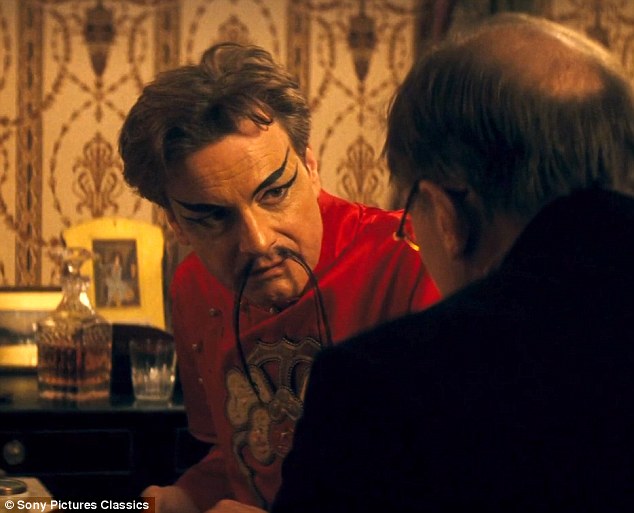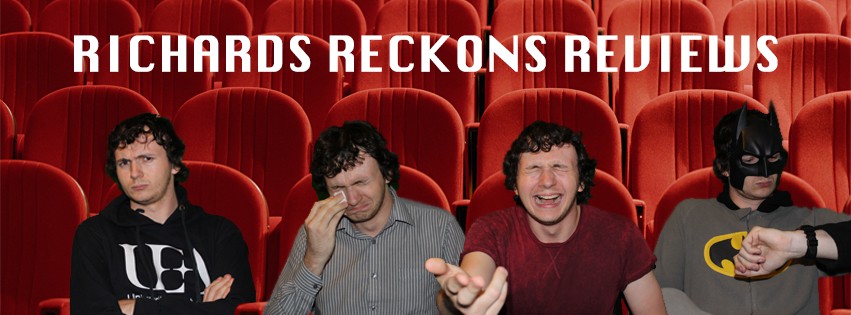Whoa whoa whoooaaa, it’s magicccc! Or is it?
Magic in the Moonlight is the new Woody Allen romantic comedy, continuing his streak of being as productive as an advent calendar factory, providing a film a year coming our way with, er, doors in it with Christmas based chocolate behind them? Maybe that analogy doesn’t work… I blame advent calendars being in the shops already.
 ANYWAY, Magic in the Moonlight not only has magic in the moonlight but it also has a PLOT in the moonlight, and that plot is this; set in the 1920s, Stanley (Colin Firth) is a successful magician who performs under the moniker Wei Ling Soo around the world. In Berlin, he’s approached by an old friend of his called Howard (Simon McBurney), who asks him to join him on a trip to the French Riviera to meet a rich family who have been charmed by the mystical Sophie (Emma Stone), who he thinks may truly possess the ability to talk to the dead and clairvoyance. Stanley being a famous skeptic, he agrees to go with him to meet her, and finds himself lost for words by her abilities.
ANYWAY, Magic in the Moonlight not only has magic in the moonlight but it also has a PLOT in the moonlight, and that plot is this; set in the 1920s, Stanley (Colin Firth) is a successful magician who performs under the moniker Wei Ling Soo around the world. In Berlin, he’s approached by an old friend of his called Howard (Simon McBurney), who asks him to join him on a trip to the French Riviera to meet a rich family who have been charmed by the mystical Sophie (Emma Stone), who he thinks may truly possess the ability to talk to the dead and clairvoyance. Stanley being a famous skeptic, he agrees to go with him to meet her, and finds himself lost for words by her abilities.

This film is set in the 1920s, and indeed feels like a movie actually SHOT in the past – from the dialogue to the setting to the plot to even the soundtrack; it feels like an older movie that’s been dipped into a sauce of modern technology (sorry, I’m hungry). As you can expect from the setting, the director and that description, it looks magnificent; the French Riviera is portrayed magnificently, with huge vistas and landscapes that echo paintings or postcards.

HOWEVER (all capitals for emphasis), just because this feels like an old-timey film does not by any means make it a good film. It may look brilliant and beautiful, but Magic in the Moonlight did not make me feel brilliant and beautiful (not that it was its mission). What I’m trying to say is that I had quite a few problems with this film. Before I go into them, this is obviously just my opinion and I think I am in the minority here, so of course take them with a pinch of salt.

Firstly, the dialogue in this film is some of the clunkiest I think I have ever seen. Some may think that this adds to its old-fashioned charm, but for me it really did not have this effect; some of the dialogue is so on-the-nose or so obviously undisguised exposition that it made me feel cold. In fact, it feels like the script was rushed, almost as if Woody wrote the lines that appear in the film as mere narrative functions with what they’re trying to convey with a note next to them saying “CHANGE THIS TO SOMETHING ELSE LATER”, but then never got around to adding his Woody Allen magic (hehe, get it?) to it. Other critics have said that the script feels rushed, and with the dialogue it really does feel that way.

Another piece of evidence for this is the plot itself and the relationships within it that feel far too rushed. Stanley remains very very skeptical for a very long time with no signs whatsoever of changing his mind, until one point where he utterly changes his point of view within a moment, without any sort of progression. Stanley forgives somebody for doing something quite bad to him very quickly afterwards, which feels extremely odd for his character. There is a twist in this movie but it’s a twist that personally I saw coming a long, long way off. I don’t want to spoil anything but towards the end of the movie, there’s a particular relationship denouement (see what I did there, with the French word?) that feels absolutely undeserved. Again, some may feel that this adds to the old fashioned feel of it, but it all personally rubbed me up the wrong way and made me disconnect from the story.
 There are also a couple more details that grated on me the whole way through; firstly, the soundtrack. The soundtrack starts off as fitting in with the old-timey aesthetic and feels very in place as a nice touch, but then it gets extremely repetitive and grates and grates and grates and grates; feeling especially jarring when quite a serious event occurs and an upbeat 1920s jazz band starts playing to accompany it. Secondly, Stanley himself. I’m a fan of Colin Firth as an actor and I think he’s great, and it’s no fault of his that Stanley is massively unlikeable. He’s arrogant, aloof and so up himself he could be using himself as his own puppet. The fact the character switches in his opinions so quickly as said above only makes it worse. He also doesn’t ever change his personality at all to get any sort of redemption or become a better person – he remains the same, bitter bastard until the end. The screen also has the annoying-in-a-wholly-different-way Brice (Hamish Linklater), a man who is utterly infatuated with Sophie and likes to show this by generally creeping around nearby, playing an incredibly irritating ukelele singing sycophantic songs at her.
There are also a couple more details that grated on me the whole way through; firstly, the soundtrack. The soundtrack starts off as fitting in with the old-timey aesthetic and feels very in place as a nice touch, but then it gets extremely repetitive and grates and grates and grates and grates; feeling especially jarring when quite a serious event occurs and an upbeat 1920s jazz band starts playing to accompany it. Secondly, Stanley himself. I’m a fan of Colin Firth as an actor and I think he’s great, and it’s no fault of his that Stanley is massively unlikeable. He’s arrogant, aloof and so up himself he could be using himself as his own puppet. The fact the character switches in his opinions so quickly as said above only makes it worse. He also doesn’t ever change his personality at all to get any sort of redemption or become a better person – he remains the same, bitter bastard until the end. The screen also has the annoying-in-a-wholly-different-way Brice (Hamish Linklater), a man who is utterly infatuated with Sophie and likes to show this by generally creeping around nearby, playing an incredibly irritating ukelele singing sycophantic songs at her.

Sophie herself, the wonderful Emma Stone, is by far the highlight of the film; she plays the mystifying, beautiful yet quite shy and vulnerable Sophie very well. On the whole, there are certainly more offensive films out there, but Magic in the Moonlight feels extremely rushed, at times grating and ultimately amounts to nothing. It looks beautiful and has some great stars really giving their all to these roles, but Woody Allen certainly has a lot, lot better in him.
